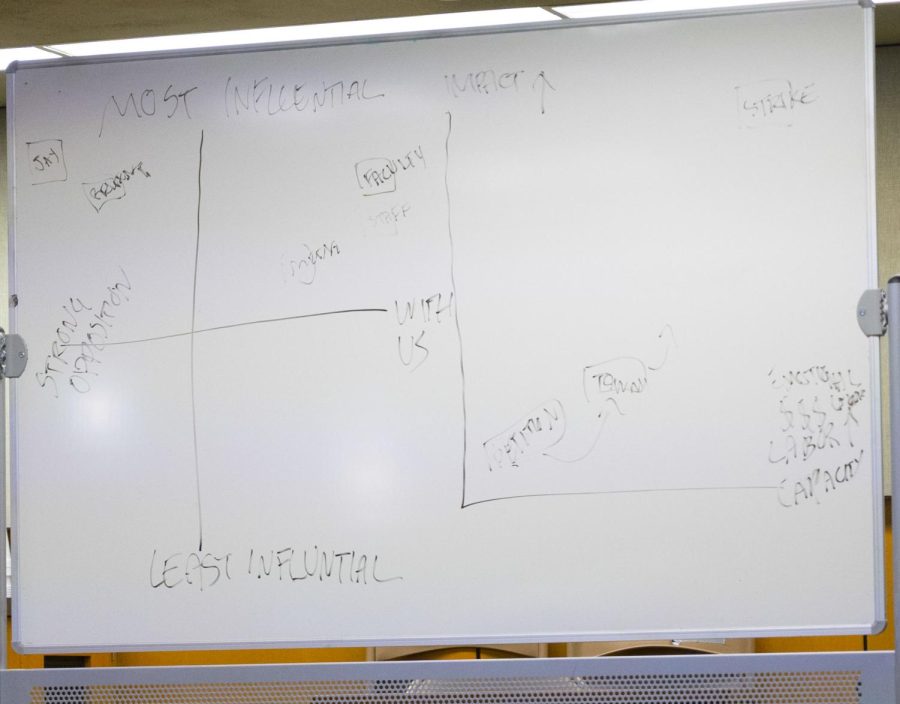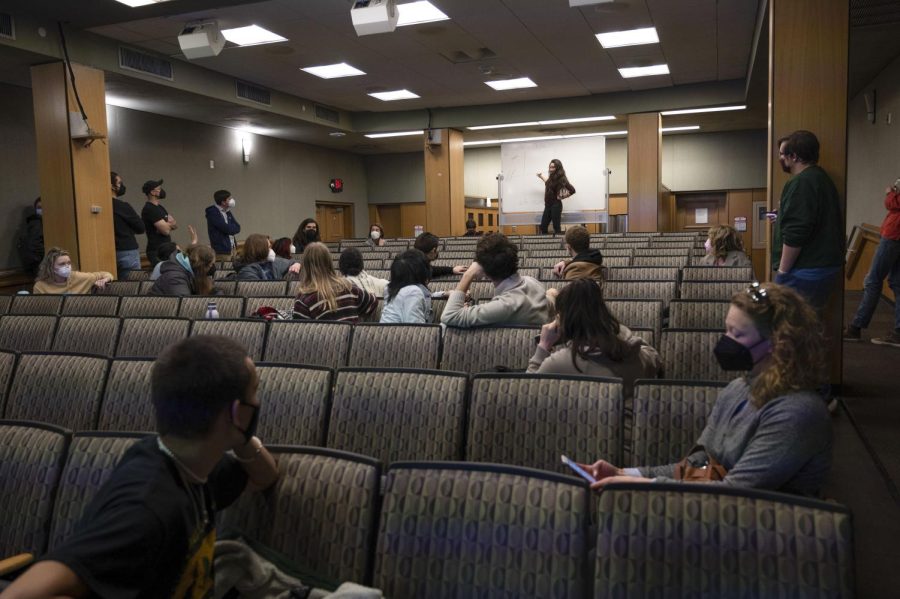Underpaid@UT holds first town hall of semester
Jackson Stublar/The Daily Texan
Presenter Alice Kurima Newberry interacts with the atendees at an Underpaid Town Hall meeting to map effective strategies to reach their goal.
February 21, 2022
Underpaid@UT, a graduate student organization advocating for fair wages and working conditions, held a recruitment meeting in which current members talked about the organization’s history and goals for the spring semester, such as getting graduate student workers higher pay and better health care.
Annie Bares, an Underpaid@UT member and English graduate student, said that by holding the meeting, the group hoped for students to connect with each other and learn about their shared concerns.
“Our ultimate goal is to build solidarity across workers and students, (and) … to make sure that UT is a University that services the public good,” Bares said. “That (means) paying workers a living wage and allowing us to do the kind of teaching and research that can really be impactful on our students and our wider community.”
In September 2021, UT announced that it will provide $11 million in graduate student funding to raise the minimum annual salary for teaching assistants and assistant instructors from an average of $12,000 to roughly $19,000, not including tuition waivers. According to the Living Wage Calculator created by the Massachusetts Institute of Technology, the average annual income necessary for a one-person household before taxes in Austin is about $28,000.
“(Graduate students) make as little as $19,000 a year. That’s basically impossible to live on (in Austin), and even graduate students who are highly paid are still only making maybe $30,000 a year,” Bares said.
The meeting began with a summary of the group’s history, going back to 2017 when a group of about 200 graduate students protested over proposed tuition tax legislation that would count tuition waivers as taxable income. The group officially became Underpaid@UT in January 2019, Bares said during the town hall.
The group currently focuses on its original goal of improving conditions for graduate student workers but added opposition to the New Research and Teaching Institute, also known as the Liberty Institute, on many legislative documents and proposals. Numerous students have voiced concerns over the institute due to the main donors and the language some government officials used to describe the institute.
Jason Castillo, Underpaid@UT co-president and a public affairs graduate student, said the Liberty Institute shows that the University has the ability to better provide for graduate student workers but chooses to allocate money toward other projects.
“I think that the fact that this has been done without any input from the students, the fact that it’s been very vague and … like the conversations about it haven’t been open, has been really concerning for our group,” Castillo said. “Especially when it’s … $75 million that’s supposed to be appropriated by 2026 that we’re totally in the dark about.”
Later in the town hall, Alice Kurima Newberry, another member of Underpaid@UT, drew a chart displaying how groups like donors and media affect Underpaid@UT. The y-axis quantified the influence of individuals like University President Jay Hartzell, Provost Sharon Wood and institutions like the UT Faculty Council. The x-axis modeled the extent to which these entities’ interests were aligned with Underpaid@UT. Newberry said the model helps others understand where overall power lies.

“As we’re starting to map out, we’re naming individuals first of all, which is really important, and we’re seeing exactly how much power they have, and we’re also mapping our power,” anthropology graduate student Newberry said.
Newberry also said that Underpaid@UT wants to organize its concerns so students feel like they are working with the support of their community.
“I think oftentimes, working and being in an academic institution, we really feel like isolated communities of privilege, but really what we know is that UT impacts the wider community,” Newberry said. “We hope that despite the organizing efforts of students and staff and the wonderful community at UT, that folks outside of UT will also be paying attention and will also be here and supportive and take action with us.”



